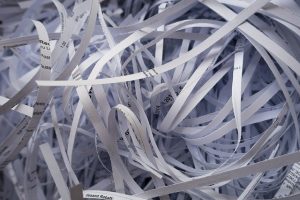
Before we answer the question as to whether or not it’s safe to throw away bank statements, we need to cover how long you should keep certain statements. The following list is provided by TrueShred.
Statements to shred right away:
- Sales receipts (unless you need them for tax purposes; in that case, scan them first)
- ATM receipts
- Packing slips and online purchase orders
- Canceled and voided checks (that aren’t tax-related)
- Utility, internet, and cell phone bills (once paid)
- Credit card, insurance, and bank account solicitations that come in the mail
- Expired warranty coverage
- Correspondences from the DMV or IRS (once settled)
- Travel-related materials (besides your passport)
List of documents to throw out after 3 years
- Bank statements
- Credit card statements (once paid)
- Pay stubs (once checked against your W-2 for accuracy)
- Medical bills (once paid and free of insurance disputes)
List of documents to throw out after 7 years
- Tax returns
- W-2s
- Tax-related receipts and canceled checks
- Records for any tax deductions you took
- Other tax records
List of documents to throw out (variable intervals)
- Auto titles (keep for as long as you own the car)
- Home deeds (keep for as long as you own the property)
- Disputed medical bills (keep until the issue is resolved)
- Home improvement receipts (keep until you sell your house and pay any related capital gains taxes)
List of documents to keep forever
- Birth certificates
- Adoption papers
- Social Security cards
- Marriage certificates
- Divorce decrees
- Citizenship papers
- Passports
- Death certificates
You should keep these documents in a very safe place. I’d recommend a fireproof safe to keep these things protected.
How should you dispose of sensitive documents?
It is safe to throw away your bank statements, as long as you do so in a particular fashion. If you have a significant amount of paperwork, hire a shredding service. If you don’t have that type of volume, put it through a shredder. Tearing the papers up once or twice won’t do the trick.
Another safe disposal method, as recommended by Patch.com is to wrap up unused or spoiled food with the sensitive documents, and throw them in the refuse bin. Scavengers are more likely to “skip over” the refuse bin when they’re looking for sensitive information for identity theft purposes.
Below, are several ways to dispose of your sensitive documents without the use of a shredder. This list is provided by WigglyWisdom.com.
- Hand shred – tear up the paper with your hands. Make sure you tear the vital information and place it in separate recycling bins.
- Burn them – local ordinances can hinder your ability to do this, so be sure to check the laws for your municipality. Tear up the paper first, in the same way, you would for point #1, in case a piece of paper flies away.
- Compost – paper breaks down and can add carbon to your compost pile.
- Soak them in water – 24 hours in a bucket of water can leave your documents illegible.
There are three other items on that list if you’d like to learn a little more.
Conclusion
Bank statements and other financial documents contain incredibly sensitive information. It’s important you a) keep proper records and b) dispose of these items in a safe manner.
Related:
Earlier this year, I wrote a piece about the most important financial documents. If you’d like to learn more, go check that out here.
**Securities offered through Securities America, Inc., Member FINRA/SIPC. Advisory services offered through Securities America Advisors, Inc. Securities America and its representatives do not provide tax or legal advice; therefore, it is important to coordinate with your tax or legal advisor regarding your specific situation. Please see website for full disclosures: www.crgfinancialservices.com
My name is Jacob Sensiba and I am a Financial Advisor. My areas of expertise include, but are not limited to, retirement planning, budgets, and wealth management. Please feel free to contact me at: jacob@crgfinancialservices.com
Leave a Reply